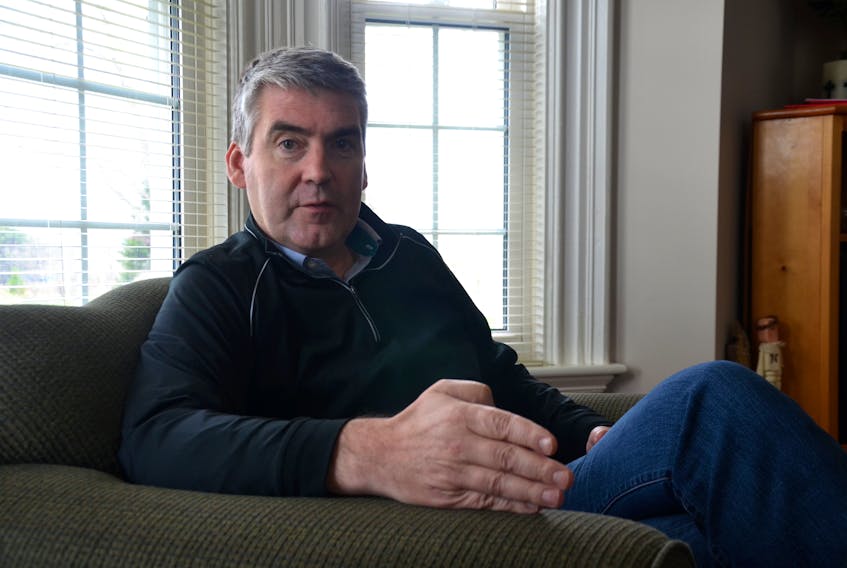MIDDLETON - It was a big year for Stephen McNeil. In 2017, his Liberals won a second provincial mandate, the first back-to-back Liberal government in decades.
But it was about more than winning an election - it was about governing. The Annapolis MLA and Nova Scotia Premier recently sat down with the Annapolis Valley Register and talked about a number of issues – from immigration and health care to foreign markets and ferries.
The premier spoke in response to several questions in an interview at his constituency office in Middleton on Dec. 22. This is the first of two parts.
Following are his responses on immigration, expanding foreign markets, and health care.
Immigration
“Just last week, it was announced that our population hit an all-time high -- the highest number of Nova Scotians living here ever before in our history,” McNeil said. “Over the last two years, we’ve attracted and retained more young people than were leaving our province. It’s the first time that’s happened since 1990. We’ve done it the last two consecutive years.”
He said his government has a great focus on trying to grow not only the population but also economic opportunities.
“If you look at many of the new immigrants that have come into our province, many have been entrepreneurs creating their own job opportunities and hiring our sons and daughters,” he said. “If you look, this province has a unique opportunity in the fact that 20,000 young people choose to come to Nova Scotia every September to go to university – 13,000 from across Canada and another 7,000 internationally. We spend a lot of time making sure that we can create a work environment so they can stay here.”
He said a lot of those students want to be in a start-up community and self-employed.
“The investments we made in Volta, investments we’re making in an ocean park off Halifax Harbour to drive innovation,” he said. “You’ll see, in the coming year, we’ll begin to create innovation hubs around our province that will be not just in the urban centre but will be in the rural parts of our province to provide the support, to allow the growth of the start-up community.”
He said it’s the kind of environment that young people want to be in.
“We’re seeing such great success with it and we’re looking forward to continuing to spread that success from the urban centre to rural parts of our province,” McNeil said.
“Immigration used to have such a negative tone because so many of us believed that immigrants were coming in and taking the jobs from our own children,” he said. “In actual fact, it couldn’t be further from the truth. When they were coming in they were actually doing jobs our children wouldn’t do or creating jobs for themselves and jobs for our own sons and daughters. I feel that and see that in the province now and that’s a positive thing.”
Foreign markets
“The previous question and this one tie together in many ways,” McNeil said. “We started out going to Asia looking for another export market for our seafood product and agrifood. We were heavily reliant on the US market and Europe.”
McNeil said that in 2013, it was his government’s belief that Nova Scotians needed another marketplace to send their products in order to keep the price where it should be.
“We went into China in 2013. We were selling about $100 million of product into Asia,” he said. “Today, we’re selling $500 million. It’s lobster, it’s sea cucumber, some of our wines are going into that environment. That’s an important marketplace when it comes to keeping the value of our lobster where it has been, and quite frankly, an important marketplace to sell sea cucumber and much of our seafood. It gives us the chance to actually make sure on the wharves in our community and all across southwestern Nova Scotia that we’re getting the top dollar for it in December. That when we’re doing that all that, money spins around in our local economy from deckhands, to fishermen, to boat owners, to the lobster pounds -- all of that is helping build the rural economy in Nova Scotia.”
McNeil himself has made several trips to China to further the Nova Scotia cause.
“We’re the only Canadian province that actually has built a China strategy,” he said. “And the next phase of this for us will be to try to get a direct flight into China from a place called Guangdong province to Halifax. If we can get a direct flight, it opens up this whole issue about immigration, but it also allows us to expose more international students to the world-class universities that we have. It brings in more research dollars to invest in not just urban but other parts of the province, whether it’s in Wolfville or CBU, St. FX. The University of St. Anne has been over looking at creating language schools in China. That, in turn, would bring investment.”
McNeil said China has been an important part of the export market for Nova Scotian industries and businesses in terms of really making sure product prices remain high.
“The American market is always our No. 1 market -- and Europe,” he said. “But we are really focused on three markets and it was because we wanted more customers. The more customers you have the better price you’re going to get for your product. On the flip side of that the next phase is how do we get inbound investment coming out of Asia. We believe, and I believe, a direct flight is paramount to that. That’s why we worked very hard to achieve that. It’s why I was really happy when the new China ambassador to Canada chose to come to Nova Scotia first – and came to talk to us about opportunities to grow this relationship.”
Healthcare
“There’s a shortage of health care providers in pockets across our province,” McNeil said. “As you know Digby had a chronic shortage at one point. We now have physicians coming to Digby, Shelburne as well. I’ve said this many times – it’s like squeezing a balloon. When we solve it in one place, it pops out somewhere else. Part of that is because we have a covert of doctors who are aging, who have big practices. It requires more than one doctor to replace them many times in a community because of the way health care providers want to work.”
His government believes the best solution in the long run is the collaborative care model.
“That doesn’t mean that if someone wants to come and work separately by themselves – we’d allow that to happen, but we think that in order to have the coverage that will be required, all health care providers are going to have to practice – nurse practitioners, family practice nurses, doctors, pharmacists who play an active role in continued delivery of health care to our citizens.”
And McNeil believes that in some communities, a social worker needs to be part of that conversation to look at the determinants of health.
“I think where one of the mistakes has been made on all sides is this idea that a collaborative care model means that you all have to be in the same physical space. It’s not true,” he said. “There is another version of that. What’s important is that all of our health care providers are communicating. You can do that through the medical record platform that we have. As you know Long and Briar Island had a nurse practitioner for years. The physician they worked under was in Annapolis Royal. So they were never physically in the same place but they communicated when they had to about a particular patient and a physician would go there once a month and see patients and they would collaborate in that case. So we need to look at all the possibilities that we can. I for one would love to see a nurse practitioner in Bridgetown who would have to work under a physician somewhere else because there are no physicians in Bridgetown and there haven’t been for quite some time.”
“The other thing that we’re doing is we’ve increased the number of residency seats in the province. So we’ve gone from I think from 36 to 46 of Canadian trained physicians and another 10 residency seats for foreign-trained doctors who would go into a residency competency program -- so we make sure they met the Canadian standards. Those are important pieces.”
Next week, Premier McNeil talks about energy, ferries, and the economy.









